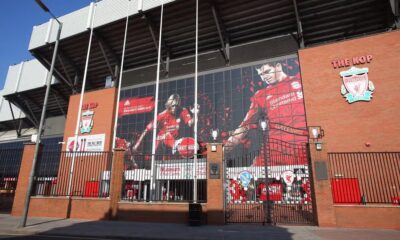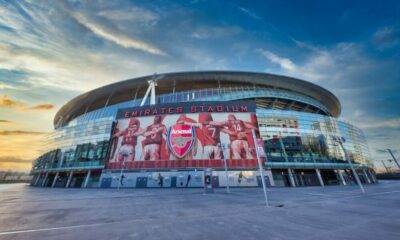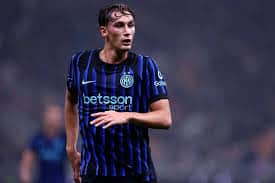Arsenal
It’s been a mixed week for the English clubs in European Competition
By Thomas Watt.
Liverpool and Fulham put in fine displays to see off first rate opposition in the Europa League, and should be given due praise for their efforts, but it has been the performances of the Champions League representatives that have hijacked most of the headlines this week.
For the first time in seven years, there will be no English representatives in the semi finals of the Champions League. This alarming statistic has been the cause of no small amount of soul searching in the media this week, as Manchester United were knocked out by Bayern Munich and Arsenal were defeated by Barcelona. Is this really a sign that the Premiership is not as strong a league as it has been in the past?
The short answer is no. The Premiership is as strong a league as it has ever been. One only needs to look at the way in which a combative upper-mid-table side such as Fulham have swept aside some of the biggest names in European Football to see that the Premiership is still has a rich depth of quality. The problem does not lie in the strength of the Top Four English sides, but in the perceived weaknesses in other European leagues.
With the consistent successes of English clubs in the Champions League (there has been an English side in every final since 2003/04), there comes the (not unreasonable) expectation that at least one of the Premiership’s biggest guns will contest the final. Given the relative ease with which the top English sides have navigated European Cup Quarter finals in recent memory, one could be forgiven for expecting them to dispatch almost all who oppose them. The difference this season was a combination of misfortune and underestimation.
Arsenal should feel no shame at all in being so ruthlessly put to the sword by Barcelona. This is, after all, probably the finest club side that the continent has seen since Arrigo Sacci’s great AC Milan side of the late 1980’s. There will be many sides who are even more efficiently picked apart than Arsenal were at the Nou Camp. Even so, would this Barcelona side have been as devastating were they shorn of their most influential midfielder, their playmaker and their main goal threat? Would the football have been quite so poetic with no Xavi or Messi, the way Arsenal were forced into playing without Fabregas, Arshavin and Van Persie? Take nothing from Barca – they are an incredible force, and it will take something (or someone?) very special to stop them becoming the first side to retain the Champions League – but suggestions of a chasm in class are difficult to accept with such key players out. There is clearly no disgrace in losing to a side of Barcelona’s calibre, and Arsenal’s Champions League post-mortem should not concentrate too much on the manner or scoreline of their defeat. Everyone knew that Barcelona were an exceptional side, but few realised just how exceptional they (and in particular, Lionel Messi) were.
Manchester United seemed to have a favourable draw when they were paired with Bayern Munich, a side who have struggled for form domestically, and who have blown hot and cold in Europe. United’s defeat was a surprise, especially considering the relative ease with which they stamped their authority in the opening exchanges, but it shouldn’t really have been. Bayern had finally put results together in the Bundesliga, and had scored ten goals in their previous four away days in the Champions League. Even still, United were the better side over the two legs, and had enough chances, possession and initiative to win the tie comfortably.
For the first fifteen minutes of the game at Old Trafford, Bayern couldn’t get near them, and Manchester United could well have been four or five up by half time. The crucial difference was in experience; while the Bayern side was composed of veterans who knew they were still in the tie – even at 3-0 down – the likes of Valencia, Gibson and the unfortunate Rafael were relatively inexperienced at putting a tie to bed at this stage. In many ways Bayern did to Manchester United what United do to so many other sides. Even when they were short of their best their obvious quality carried them, and little by little they worked their way back into the contest.
Make no mistake, financial constraints aside, this Manchester United side will be back stronger than ever next season, and if the likes of Valencia and Rafael can learn from their experiences this week they will be considerably better players for it. It’s been all too easy at times, especially since Christmas, to forget that this is a Manchester United side who are adapting to a new formation and are still learning to cope without Cristiano Ronaldo.
Part of the reason behind the relatively stable transition has been the form of Wayne Rooney, who’s inclusion was a gamble which didn’t pay off. The more pragmatic United fan would see that Rafael, naive as he was for the red card, has the makings of an excellent marauding right back who’s pace and footwork fits the Alex Ferguson ideal perfectly. Whisper it, but Nani has started to finally look like he might yet fulfil his undoubted potential, while Antonio Valencia has lost the apprehension that he appeared to have when he first moved to United. At the start of the season he was a player for Manchester United, he is now a Manchester United Player.
In many ways, Chelsea’s demise was similar to that of Manchester United. Inter Milan are a very good side, but are a far cry from the all conquering Italian teams of the 1990’s. Ancelotti’s Chelsea are an entirely different prospect from Mourinho’s version, and while The Special One was confident about a result, Inter’s recent record against English opposition didn’t make for encouraging reading. Part of the reason Ancelotti was brought to Stamford Bridge was to play a more expansive, entertaining game, while Mourinho had been criticised by some quarters for his rigid, defensive style. The Italian manager’s style may win favour with purists, but Jose Mourinho’s pragmatic approach has been perfectly suited to the European game for the last seven years. Mourinho also held a distinct tactical advantage, as he knew exactly what almost all of the Chelsea squad were capable of through first hand experience. To some extent, for better or worse, this is still “his” squad. “The Special One” has never made waves in Europe with free flowing football, or sides that totally outplay the opposition, but he has been remarkably successful with a minimalist, tactical, thorough game, which may yet prove a tricky obstacle for even Barcelona.
It will be difficult for supporters of the Premiership’s top three to watch the Champions League’s closing stages without thinking about what might have been. But the trio have more important things at hand, with Arsenal, Chelsea and Manchester United having a more than realistic chance of Premiership glory. By the time 2010/11 season starts, you can bet that these three sides (plus Manchester City, Spurs or Liverpool?) will be amongst the frontrunners again. In the meantime, Liverpool and Fulham could yet meet in an all English final in the Europa League. Reports of the demise of the Premiership as a force seem greatly over-stated.
















